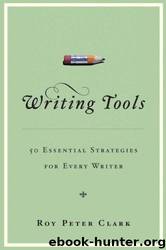Writing Tools by Roy Peter Clark

Author:Roy Peter Clark [Clark, Roy Peter]
Language: eng
Format: epub
Published: 2011-03-30T07:00:00+00:00
In 1996 the St. Petersburg Times published my series "Three Little Words," the story of a woman whose husband died of AIDS. The series ran for twenty-nine consecutive days and received unprecedented attention from local readers and journalists everywhere. A month of chapters was a lot to ask of readers. But here was the catch: no chapter contained more than 850 words, so you could keep up with the narrative by reading five minutes a day. Long series, short chapters.
Good writers turn stories into workshops, intense moments of learning in which they advance their craft. I learned more about reporting and telling stories from "Three Little Words" than from any other writing experience of my life. I'm still learning from it. But I did not learn how much I learned until I stumbled on a strategy I've turned into a tool: I write a mission statement for each story.
Whether we want them to or not, readers and critics examine the work of writers to grasp a sense of our mission and purpose, Too often, writers resist, as Mark Twain did when he posted this notice atop his most famous novel:
Persons attempting to find a motive in this narrative will be prosecuted; persons attempting to find a moral in it will be banished; persons attempting to find a plot in it will be shot.
But where the writer is silent, the critic, in this case Bernard De Voto, fills the void:
Huckleberry Finn also has become a universal possession. It is a much deeper book than Tom Sawyer — deeper as of Mark Twain, of America, and of humanity. When after some stumbling it finds its purpose, it becomes an exploration of an entire society, the middle South along the river. In accomplishing this purpose it maintains at the level of genius Mark's judgment in full on the human race. It is well to remember that no one had spoken so witheringly to Americans about themselves before Huck raised his voice.
Most writers aspire to some invisible next step — for a story or a body of work. For some, this aspiration remains unfilled, becomes malignant, and metastasizes. Writing down your mission turns your vague hopes into language. By writing about your writing, you learn what you need to learn.
I scribbled my mission for "Three Little Words" on two pages of a legal pad. It covers the content and the form of the story, what I was writing about and how I wanted to write it. My mission begins: "I want to tell a human story, not just about AIDS, but of the deeply human themes of life, love, death, sorrow, hope, compassion, family, and community." The mission statement includes these goals:
• I want to portray my protagonist as a fully human character — and not some kind of cardboard saint.
• I want to do this so people can identify with and care for her and her family. It's so easy to see people with AIDS as "the other," the outcast, suffering sinners.
• I want to help illuminate AIDS, and help educate the public about key aspects of the disease.
Download
This site does not store any files on its server. We only index and link to content provided by other sites. Please contact the content providers to delete copyright contents if any and email us, we'll remove relevant links or contents immediately.
Autoboyography by Christina Lauren(4681)
Asking the Right Questions: A Guide to Critical Thinking by M. Neil Browne & Stuart M. Keeley(4589)
Dialogue by Robert McKee(3587)
Eat That Frog! by Brian Tracy(3521)
Sticky Fingers by Joe Hagan(3456)
Journeys Out of the Body by Robert Monroe(2993)
Elements of Style 2017 by Richard De A'Morelli(2945)
Annapurna by Maurice Herzog(2845)
Schaum's Quick Guide to Writing Great Short Stories by Margaret Lucke(2806)
Full Circle by Michael Palin(2780)
The Diviners by Libba Bray(2446)
The Art of Dramatic Writing: Its Basis in the Creative Interpretation of Human Motives by Egri Lajos(2416)
The Mental Game of Writing: How to Overcome Obstacles, Stay Creative and Productive, and Free Your Mind for Success by James Scott Bell(2396)
Why I Write by George Orwell(2361)
Atlas Obscura by Joshua Foer(2351)
In Patagonia by Bruce Chatwin(2274)
The Fight by Norman Mailer(2160)
The Elements of Style by William Strunk and E. B. White(2077)
Venice by Jan Morris(2052)
